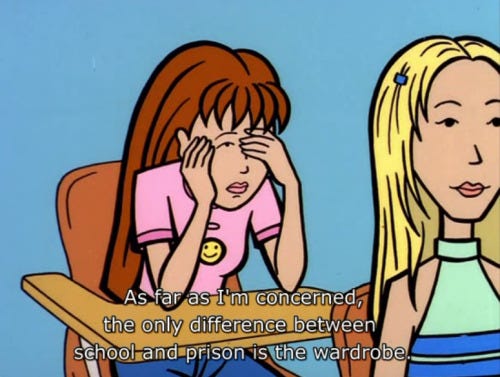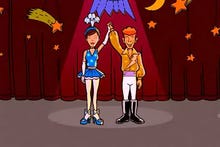Best to be both loved and feared
MTV's "Daria" gave the 1990's a show with a lot of elements with a lot of depth, but one that bears rexamination is the lessons in statecraft from everyone's favorite member of the Fashion Club
“…it is necessary to be a fox to discover the snares and a lion to terrify the wolves” - Niccolo Machiavelli, The Prince
“Look, when you get thrown off a horse, you have to get back up and shoot it, right?” - Quinn Morgendorffer
Iconic animated TV series Daria ran for 5 seasons, and centered on identifying, and rejecting as overly cliche, common high school tropes in American culture. This rejection of the reductionism had no firmer dialetic than within the Morgendorffer household, and in particular, protagonist Daria, and sleeper protagonist, Quinn, who I’ll argue is the real hero of the story, and by far, the dense character that makes the series’ point more so than the kneejerk, performative, but ultimately materially indulgent, rejection of pop culture (and specifically not consumerism) that Daria represents.
One common interpretation of Niccolo Machiavelli’s The Prince is not only that it’s intended to be read as satire, but that it’s an accounting of how things are, rather than how Machiavelli suggests they should be; this is how you exploit an exploitative system to gain friends and influence people, and not why, or why not, you’d ever want to. I think Quinn best represents this in very real way over the arc of the series, albeit, at first, as an uncriticial believer in the system as a constant, and later on (fully by the series conclusion TV film Is it College Yet?) as the most critical skeptic of the prevailing social order and its necessity, and fittingly, over the most human of impulses, romantic attraction to someone the social order she is conditioned into suggests she should not find an emotional or intellectual bond with.
Where Daria and Quinn align is on the fundamental artifice of the societal structure of high school popularity— the latter simply understands how to manipulate it, while the former understands its limits and that it ultimately is too narrow to ever matter, but only Quinn can seem to walk this line to ultimately tap one’s own potential while rejecting what is ultimately also pointless ceremony and bureaucracy for its own sake in upholding a pointless social order. This conflict is far more relateable than many care to admit— you see yourself as a Daria, but relate to, and find more compelling, the arc of Quinn, who ultimately proves herself compassionate to Daria, but rarely the other way around. Who is the more well-rounded person equipped for the real world, if we’re to accept that empathy, amongst all else, is suspect and weak?
“In conclusion, the arms of others either fall from your back, or they weigh you down, or they bind you fast.” write Machiavelli, and this is, at the heart of it, the question being posed by Daria as a franchise— the knowing assimilation into the prevailing social system by Quinn, the rejection of all of it while remaining, on paper, a successful participant (a good student, for example) like Daria, or for example, a character like Jodie, who is aware of the limitations of the systems and potentially its biases against her and rather than reject it, she seeks to become accepted by the power structure; something, again, more people would probably relate to than they care to admit, but unlike Quinn, this isn’t a calculation, it’s a reasonable, rational bet in a complex maze of social interactions where one wrong move will bar you forever, and the stakes for Jodie are, potentially, much higher. This is important to keep in mind, in understanding the framing of some of these conflicts in the series as denser than they might appear.
You either become the system, build a coalition within or against it, or rebuke it entirely, but only one of these carries a framework for maintaining the robust and prosperous kingdom of The Prince and who succeeds within it (i.e. survives as a leader, rather than deposed): “He who becomes a Prince through the favour of the people should always keep on good terms with them; which it is easy for him to do, since all they ask is not to be oppressed” is a sentiment that Jodie and Quinn, both, understand to a high degree— Jodie’s preeminence on the social food chain at Lawndale High is easily enough explained, she’s well-liked by Kevin and Brittany, but also held in high esteem by Daria and Jane, which seems like, ultimately, the move to remain at the top of any social order, however, this precludes the existence of a class of ruler with more tenuous legitimacy but raises the stakes (realistic or not) on what it means to be a serf in this kingdom. I could go on and on about Jodie’s arc in the story, but specific to this dynamic, she’s probably the closest to exist as an analogue for a legitimate student leader. Instead, enter: the Fashion Club.
“At this point one may note that men must be either pampered or annihilated. They avenge light offenses; they cannot avenge severe ones; hence, the harm one does to a man must be such as to obviate any fear of revenge.”
Ultimately, in the series, Quinn detonates “The Vest” and ends the power struggle in the Fashion Club that runs the series arc between herself and the President, Sandy, by essentially disbanding the group by quitting when Sandy bars Quinn from dating a nerd (her tutor), and absent Quinn, the benevolent leader in the club, Tiffany and Stacy, are comfortable leaving Sandy, the tyrant, to stand alone— a harm to her prevailing leadership that can’t be avenged without the threat the club poses to those outside it in the Lawndale social order. This exchange, I think, sums up the options of a ruler to be, either, benevolent or tyrannical yet stable— the latter breeds resentment and disloyalty in the face of tumult or, at worst, legitimacy crisis.
A running bit in the show with regard to the Fashion Club is that Quinn and Stacy often to butt heads with Sandy, but are shot down and accept this to avoid conflict—only Stacy ever defies the social order and successfully avoid challenging it:
“It is easy to persuade them about some particular matter, but it is hard to hold them to that persuasion… when they no longer believe, they can be forced to believe.”
This is fundamentally the ethos against which Quinn is brushing up against the entire series, and Stacy fundamentally conflicts with throughout as a “clumsier” operator in this power structure, ultimately one that Quinn declines to run with to impose her will with Sandy lacking support.
What Quinn’s arc represents through all of this is an acknowledgement from the start that it’s a construction that she’s participating in, her disgust and then bewilderment at Daria’s shirking of the whole farce of high school popularity. However, what comes of this is an acknowledgement that maybe it’s not worth taking seriously, and then ultimately, when Sandy, fully steep’d in the belief that any of this matters, rejects it— in preserving the social order for so long, and seeing that it exists, but that she will no longer participate, she commits herself to the idea of citizenship, that the people around you and your relationship to them matter, beyond just nodes in a network or that these relationships merely have utility.
We talk a lot about people listening and learning, and well, that’s what Quinn does throughout the series, whereas other characters simply become more themselves— there are reasons for this, and they’re good ones, but for as maligned as this character is while retrospecting on the series, there’s few inspections of what the character of Quinn gets right about the 90’s that her real-life counterparts failed to carry forward in the real world.
“A prince must have no other objective, no other thought, nor take up any profession but that of war, its methods and its discipline, for that is the only art expected of a ruler.”
So, why then, if Quinn is so calculating, does she participate in this at all? Well, absent the political context of today (or even 1995 when this was possibly even more relevant, pre-total normalization, post-doing anything about it for liberal sensibilities) in Machiavelli’s time, rampant consumerism, the metastasization of corporatism, influence everything from how consumers view the market and their place in it, to how predatory and high-stakes it is allowed to be by default for new entrants; all status is fleeting, and must be ruthelessly fought for in order to be held and considered, under this framework, deserved or meritocritous.
We’ve reached the stage of synthesis with our media that was intended to be satirical of the extremes, but is merely, today, a lukewarm nostalgia document for its foresight and we have to laugh to keep from crying—the ride was comfortable for those who knew how to exploit a system resistant to systemic reforms, with an end in sight (collapse) but chose to delay that particular reality; collapse could be comfortable if the end was always democratizing. It’s not a noble impulse, but a comprehensible one, discrete from openly being tyrannical (Sandy) or apathetically/performatively fatalistic (Daria) or even just sufferer of all revisionists, with much to criticize but little constructively (Jane).
“Only the expenditure of one’s own resources is harmful; and, indeed, nothing feeds upon itself as liberality does. The more it is indulged, the fewer are the means to indulge it further. As a consequence, a prince becomes poor and contemptible or, to escape poverty, becomes rapacious and hateful. Of all the things he must guard against, hatred and contempt come first, and liberality leads to both.”
Ultimately, what makes Quinn’s story arc so compelling is that she’s simultaneously the legitimate successor to the failed, overextended tyrant, Sandy, but an indulgent and demaning leader in her own right, however judicious about this she may be, avoiding the ineveitable legitimacy crisis from overindulgence (Sandy), or the over virtuousness that comes from being overly a patron to ones constituents as an autocrat (why someone like Stacy could never lead the club).
Extras
Some things I’m reading, watching, or listening to that I am now recommending:
26 Times Quinn Morgendorffer Was The Flawless Queen Of "Daria"


